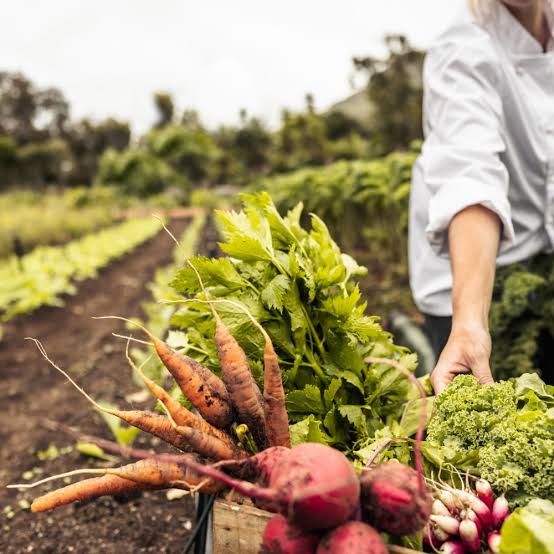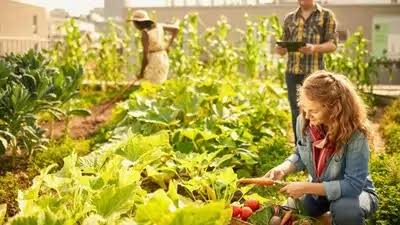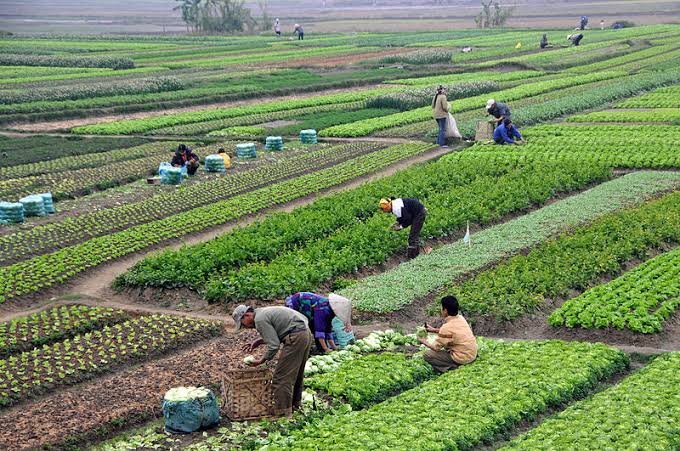Sustainable farming is a way of growing food and raising animals that’s good for the Earth and for people. It’s like taking care of our planet while also making sure we have enough food to eat. Sustainable farming is important because it helps us protect the environment, save resources, and keep our food supply safe.
When farmers practice sustainable farming, they use techniques that don’t harm the soil, water, or air. For example, they avoid using too many chemicals that can hurt the environment. Instead, they might use natural ways to control pests, like ladybugs or friendly insects. This helps keep the balance in nature and doesn’t harm other animals.
In sustainable farming, farmers also think about the future. They want to make sure there will be good soil and clean water for the next generation. So, they use methods that keep the soil healthy. They rotate crops, which means they don’t plant the same thing in the same place year after year. This helps the soil stay rich and full of nutrients.
Another important part of sustainable farming is using less water. Farmers find smart ways to use water efficiently. They might use drip irrigation, which delivers water right to the plant roots, or collect rainwater to use on their crops. This is great because it saves water for other uses and doesn’t waste it.
Animals are also taken care of in sustainable farming. They have clean and spacious places to live, and they are treated well. Happy animals make better food, and it’s the right thing to do. Farmers who practice sustainable farming often let animals graze in pastures, which is like a natural buffet for them.
One big goal of sustainable farming is reducing waste. Farmers try not to waste anything, and they recycle as much as possible. They might use compost, which is like superfood for the soil, made from old plant material. This helps the soil and reduces the need for chemical fertilizers.
Sustainable farming also supports local communities. When you buy food from local farmers who use sustainable methods, you help the people who live near you. It’s like being a good neighbor.
In addition, sustainable farming is all about making choices that are good for the Earth, good for people, and good for the future. It’s like a big puzzle where everything fits together perfectly to create a healthier, happier world. So, next time you enjoy a meal, remember that sustainable farming plays a big part in making it delicious and environmentally friendly.
Read Also: Different Systems of Goat Production for Maximum Productivity
What are the Techniques for Sustainable Farming?

Sustainable farming involves various techniques and practices aimed at minimizing environmental impact, conserving resources, and ensuring long-term agricultural productivity. Here are some key techniques for sustainable farming:
1. Crop Rotation: Farmers alternate the types of crops they grow in a specific field each season. This helps improve soil fertility, control pests and diseases, and reduce the need for synthetic fertilizers and pesticides.
2. Cover Crops: Planting cover crops like legumes and grasses during fallow periods helps prevent soil erosion, improves soil structure, and adds nutrients to the soil.
3. Reduced Tillage: Minimizing soil disturbance through reduced or no-till farming methods helps retain soil structure, reduce erosion, and sequester carbon in the soil.
4. Agroforestry: Combining trees or shrubs with crops or livestock on the same piece of land provides multiple benefits, including improved soil fertility, biodiversity, and carbon sequestration.
5. Organic Farming: Avoiding synthetic chemicals, using organic fertilizers, and practicing natural pest control methods are key components of organic farming, which helps maintain soil health and protect the environment.
6. Integrated Pest Management (IPM): IPM involves monitoring and using a combination of biological, physical, and chemical methods to manage pests while minimizing harm to beneficial organisms and the environment.
7. Efficient Water Management: Sustainable farmers use methods like drip irrigation, rainwater harvesting, and water-saving technologies to reduce water usage and avoid water wastage.
8. Livestock Management: Sustainable livestock practices include rotational grazing, providing animals with open spaces, and using feed that doesn’t harm the environment.
9. Biodiversity Conservation: Encouraging natural biodiversity on farms helps control pests, pollinate crops, and maintain ecological balance.
10. Composting and Recycling: Farmers use composting to recycle organic waste and produce nutrient-rich soil amendments, reducing the need for synthetic fertilizers.
11. Energy Efficiency: Implementing energy-efficient technologies in farming operations, such as solar panels or wind turbines, reduces the environmental footprint of agriculture.
12. Sustainable Pest Control: Using natural predators, beneficial insects, and traps to manage pests without resorting to chemical pesticides.
13. Soil Testing and Nutrient Management: Regular soil testing helps farmers adjust nutrient application to match crop needs, reducing excess fertilizer use.
14. Agribusiness Collaboration: Farmers collaborate with agribusinesses, universities, and local organizations to share knowledge and resources for sustainable farming.
15. Precision Agriculture: Employing technology, like GPS and sensors, to optimize resource use and reduce waste in farming practices.
These techniques, when combined, help promote a more sustainable and environmentally friendly approach to agriculture, ensuring the long-term health of both the land and the food it produces.
Read Also: The Principles of Goat Production for Maximum Production
Benefits of Sustainable Farming

The adoption of sustainable farming practices comes with several significant benefits, not only for farmers but also for the environment and society as a whole. Here are some of the key benefits of sustainable farming:
Environmental Conservation
1. Soil Health: Sustainable farming practices improve soil quality and reduce erosion, enhancing long-term agricultural productivity.
2. Water Quality: Reduced chemical use and efficient water management minimize water pollution and protect aquatic ecosystems.
3. Biodiversity: Encouraging natural biodiversity helps maintain ecological balance and supports pollinators and beneficial insects.
4. Carbon Sequestration: Methods like reduced tillage and agroforestry sequester carbon in soils and trees, mitigating climate change.
Resource Conservation
1. Water Efficiency: Sustainable farming reduces water waste, ensuring the availability of this critical resource for future generations.
2. Energy Efficiency: Implementing renewable energy sources reduces the carbon footprint of agriculture.
3. Reduced Waste: Recycling and composting reduce waste and minimize the need for synthetic fertilizers.
Economic Viability
1. Cost Savings: By reducing the need for chemical inputs and improving resource efficiency, sustainable farming often leads to cost savings for farmers.
2. Market Access: Many consumers and markets increasingly value sustainable products, providing opportunities for premium pricing and market access.
Health Benefits
1. Safe Food: Reduced chemical use and better farming practices lead to safer and healthier food for consumers.
2. Reduced Health Risks: Farmers and farmworkers benefit from reduced exposure to harmful chemicals.
Resilience
1. Climate Resilience: Sustainable practices help farmers adapt to climate change by promoting drought resistance and reducing vulnerability to extreme weather events.
2. Crop Diversity: Crop rotation and diversified farming systems reduce the risk of crop failure due to pests and diseases.
Community and Social Benefits
1. Rural Development: Sustainable farming supports local economies and creates jobs, contributing to rural development.
2. Food Security: By maintaining soil health and conserving resources, sustainable farming contributes to long-term food security.
Animal Welfare
1. Ethical Treatment: Sustainable livestock practices provide animals with humane living conditions, improving animal welfare.
2. Educational Opportunities: Sustainable farming offers educational opportunities for farmers, students, and the community to learn about environmentally friendly and responsible agriculture.
In summary, sustainable farming practices offer a holistic approach to agriculture that considers the well-being of the environment, society, and future generations. These practices promote a balance between productivity, profitability, and environmental stewardship, ultimately leading to a more resilient and sustainable food system.
Read Also: A Guide to Understanding Universal Wastes

